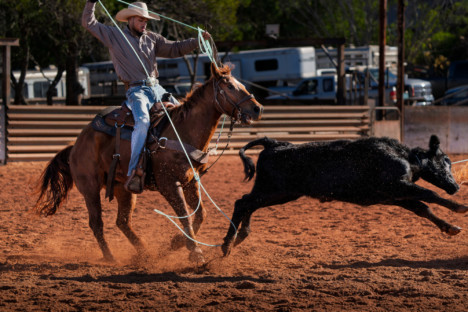Molokai Paniolo Heritage Festival & Rodeo
By Léo Azambuja
A full-day rodeo festival last Saturday in Hoʻolehua attended by hundreds of people celebrated the paniolo culture that is still alive and thriving on Molokai.
“This is the Molokai Heritage Rodeo. Today we are just coming together to rodeo and have fun, and share a little bit about the paniolo heritage,” Cheyanne Keliihoomalu said. “We also honored two of our very dear paniolo who just passed away; Uncle Vernon DeMello and Uncle Clifford Dudoit.”
The festival opened at 8 a.m., but the rodeo events began at noon and lasted way past 4 p.m. Seventy-three paniolo, including 17 from other islands, from little keiki to kupuna competed in 16 categories. Somewhere between 50 and 60 horses were used.
Cheyanne, a sixth generation paniolo, was one of the competitors, along with her parents and her sister Brooke. Her mother, rodeo organizer Deanna Keliihoomalu, said the event was for the cowboys’ entertainment.
“They go out there, they work hard all day with their cattle and stuff, and then this is their time to just have some fun,” Deanna said. “To have fun and for bragging rights.”
Several hundred people crowded the bleachers and tents surrounding the Deluna Rode Arena to watch the paniolo showcase their horse riding and cattle roping skills.
The stock was provided by MP Kamakana, and the facility was provided by Benny Deluna, according to Cheyanne.
A large tent next to the arena housed a few massage tables, hot dog and popsicle vendors, plus a stage for the live music. Another tent took care of recycles to minimize waste. Kids were everywhere, playing with farm toys and trying to hone their roping skills on a dummy steer.
Paniolo fashion was in evidence; even those not competing wore their cowboy boots.
“It was more about just the paniolos coming together to have a nice time, have fun and fellowship with one another,” Deanna said.
The rodeo used to be held since the 1990s, organized by Deanna’s father. But the rodeo was put on hold during the COVID-19 pandemic, and it was never held again, partly due to some changes at Molokai Ranch, where it used to be held.
“Now we are trying to pick it back up again,” Deanna said, adding it was the first time it was held at Benny Deluna’s arena.
The Hawaiian paniolo tradition goes back to the early 1830s, when King Kamehameha III hired three Mexican cowboys from California (it belonged to Mexico at that time) to solve the wild-cattle problem on the Big Island.
In the late 18th century, Capt. George Vancouver had gifted 19 longhorn cattle to Kamehameha I. After decades of roaming free, the cattle multiplied and had become a serious problem.
The Hawaiians called those first vaqueros “spaniolos” because they spoke Spanish. Since then, paniolo became the word for cowboy in Hawaii.
The vaqueros taught Hawaiians how to properly handle cattle while riding horses. They also introduced a few things that would become part of local culture. The pipi kaula came from their “carne seca,” or dried meat, and the Hawaiian slack-key guitar developed after the vaqueros brought their Spanish guitars.
Double mugging is a specific event that started in Hawaii, according to Cheyanne. A paniolo on a horse ropes a calf, and another person on the ground runs and mugs the calf — basically takes it down — after which both competitors tie the calf’s legs.
Cheyanne said she hadn’t competed in a rodeo since she was in high school almost 20 years ago. But being a paniolo, whether as a rancher or as a cowgirl, is still part of who she is. So she decided to ride in the arena again this year.
“It’s just something that our family has done for many years, and this year I felt like it was time to come back. I was just finding that piece of myself,” Cheyanne said.
Besides many familiar faces that hadn’t been around each other lately, there were paniolo from the Big Island, Oahu and Kauai, she said.
“It’s just nice. It’s like a big family, people who we haven’t seen for many years,” Cheyanne said. “It’s exciting.”












Don't have a Molokai Dispatch ID?
Sign up is easy. Sign up now
You must login to post a comment.
Lost Password